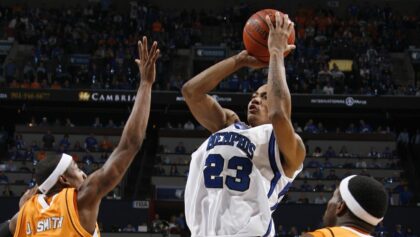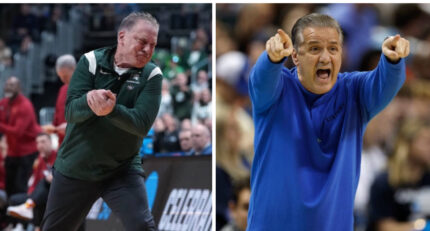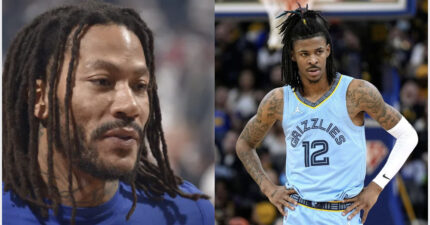Ten years ago during March Madness, the casual basketball fan was introduced to Derrick Rose, the teenage point guard prodigy at the University of Memphis.
His mix of explosive yet controlled athleticism kept fans mesmerized. Along with his coach, John Calipari, who had the personality to match his star point guards outstanding play, and talented teammates including enforcer Joey Dorsey think Sonny Liston with a basketball and Chris-Douglas Roberts, the Memphis Tigers took the nation by storm during the ’07-’08 college hoops season.
Lesley Visser: Memphis Tiger Feature Final Four 2008
Lesley Visser Memphis Tiger Feature Final Four 2008 with Derrick Rose – 04/05/2008 Air Date
To watch them play was to witness an abundance of athleticism and aggression, with constant motion on offense. Penetrating and kicking the ball, they overwhelmed defenses with their talent. Their style of play and Caliparis dribble-drive motion offense changed how the game was played. And nobody was better than Derrick Rose.
In their short time together, Rose and Coach Cal broke through the faade that top players wanted to go to college to get an education and that college coaches only wanted student-athletes for pure amateur reasons. Everybody knew that Rose was one-and-done. Everybody knew that Coach Cal didnt care. This made watching that team even more intriguing.
They called the NCAA on their BS and proceeded to kick ass.
But for those in the city, the Rose-led Tigers were so much more than renegades. They were a symbol of racial reconciliation.
As we often do in sports, we look for stories that unite us racially, so that we dont have to do the hard work beyond the playing field to bring down the structures of inequalities. Remember the Titans. Glory Road. Loyola and the Game of Change.
Glory Road (2006) Official Trailer # 1 – Josh Lucas HD
Subscribe to TRAILERS: http://bit.ly/sxaw6h Subscribe to COMING SOON: http://bit.ly/H2vZUn Subscribe to CLASSIC TRAILERS: http://bit.ly/1u43jDe Like us on FACEBOOK: http://goo.gl/dHs73 Follow us on TWITTER: http://bit.ly/1ghOWmt Glory Road (2006) Official Trailer # 1 – Josh Lucas HD In 1966, Texas Western coach Don Haskins led the first all-black starting line-up for a college basketball team to the NCAA national championship.
No city promotes that myth-making process better than Memphis. It is a basketball city. Its a city divided by race. Its a city forever linked to the assassination of Martin Luther King, Jr.
Those are the facts.
When the Memphis hoops program is rolling, those realities play out publicly as a local fan base grasps for the one thing they think will bring them together; winning basketball. And one cannot understand the reaction to Rose and his Tigers team without understanding the history of race and basketball in the city.
Memphis will always be haunted by an unshakable fact: On April 4, 1968, an assassin murdered Dr. Martin Luther King Jr. on the balcony of the Lorraine Motel. King had been in the city to support a black garbage workers strike while also raising awareness for his Poor Peoples Campaign.
Smithsonian Channel releases footage from new MLK assassination documentary
Smithsonian Channel releases footage from new MLK assassination documentary
His assassination sparked flames of racial rebellion in Memphis, dividing the city even further. Those wounds never properly healed, but residents told themselves that basketball brought momentary relief.
There are two legends that Memphis claims: Elvis Presley and Larry Finch. The outside world knows Presley, but only basketball diehards and old-school souls recall Finch.
The Finch family typified the poor family that King fought for. Finch grew up in Orange Mound, a black section of the city, with six siblings and a mother that made $5.50 a day working as a maid.
Finch, who attended Melrose High, a black high school before integration, was a smooth shooting guard that led the city in scoring and his team to the district championships. In the wake of Kings assassination, Finch stood as one of the top recruits in the country.
The University of Memphis Centennial Moment: Larry Finch
Coach Josh Pastner on the tremendous impact and legacy of Larry Finch at both the U of M, and the city of Memphis.
Every college came calling, but the hometown hero signed with Memphis State in 1969, saying Memphis is my home, and I decided I wanted to stay. The move made him the first local black standout to sign with the school. In a divided city, he morphed into a hero, a symbol of hope.
Finch brought with him his high school teammate Ronnie Robinson, and soon other talented black players followed. And the coach, Gene Bartow, never hesitated to play five black players at the same time. Bartow even went into the black neighborhoods with his black players to talk to the community, and he sent his son to Melrose.
Most important, the local black star brought winning basketball to the city. In 1973, the Memphis State Tigers made it all the way to the NCAA Championship. UCLA and Bill Walton destroyed them, but that didnt matter. Finch brought the city together.
When they returned from their championship loss, 5,000 fans waited at the airport to celebrate them, including Memphis mayor and Tennessees governor. Black City Councilman Fred Davis was there too, and it was his speech that spoke to the teams meaning in the city.
Davis, who won his council seat in 1968, and had the difficult task of keeping the city together after Kings assassination, turned to Finch and Robinson and told the crowd, When they came on the scene four years ago, this town was in turmoil. They have done as much to bring this town together as any two people.
1973 NCAA Championship (Memphis St vs. UCLA) from fan’s view
NCAA Champion Magazine Associate Director Greg Johnson recounts the 1973 National Championship game between the Memphis State Tigers and UCLA Bruins. Bill Walton led UCLA with 44 points on 21 of 22 shooting to propel the Bruins to the national title.
And thats the narrative that continues to live.
The narrative that basketball saved the city, however, allowed the university and the city to continuously turn a blind eye to the injustice of exploitation. The Tigers made the Final Four again in 1985, momentarily distracting the city from the memory of King and the continued racial divide.
But on their road to the Final Four, the school exploited black players. The local NAACP charged the university with racial discrimination, pointing out that between 1973 and 1985, the university did not graduate a single black basketball player.
Invested more in the narrative of racial harmony than black academic success, the school president, told the New York Times, that in the city where King was assassinated, The city desperately needs a winner. In the city, things came to a halt during the basketball playoffs. The basketball team has done more to bring blacks and whites together than anything.
And the Mayor, Dick Hackett, added: The success of the team is a positive point and it does help race relations, but it takes more to round out a community. Indeed, it does.
But thats the hard work, and so few seem willing to deal with the legacies that Jim Crow and structural inequalities brought to the city. Instead of fixing its inherent problems, Memphis waited for basketball to save them.
The university fired their coach Dana Kirk, not for failing black students academically, but for running a renegade program mired in FBI investigations for gambling and NCAA violations for impermissible benefits. With the school and city embarrassed by those blemishes, in 1986 they once again turned to Finch, this time as their head coach.
1985 NCAA Final Four – Villanova vs Memphis State
First semifinal of the 1985 NCAA Final Four between Villanova and Memphis State.
During Finchs tenure, he won 220 games, recruited local black stars Elliott Perry and Penny Hardaway, and brought Hardaways 1991-92 team to the Elite 8. With Penny as the star, the city started to feel that magic again.
But then Hardaway left for the pros, and Finchs subsequent teams under-performed. In 1997, the school controversially fired the hometown hero. Once again, the hope for racial reconciliation blinded folks to the injustice.
Although Finch helped establish some academic integrityPerry graduated and Penny made the deans listthe school once again failed its black athletes. Of players entering the school between 1990 and 1996, only two black players graduated.
Penny Hardaway Ultimate Memphis State Highlights Montage 1991 1993 Phenomenal Plays! RARE!
Penny Hardaway Ultimate Memphis State Highlights Montage 1991 1993 Phenomenal Plays! RARE!
And no black player graduated from 1996 to 2000. To erase the shame of the city, the Tigers tried to get back to winning. In 2000, Calipari walked through the doors. He slowly brought in top talent, and soon the city became proud again. Seven years later, he landed his biggest gem, Derrick Rose.
The first-time fans saw Rose play; the crowd went crazy. It was midnight madness, 2007, the first official basketball practice of the season and the kid from Chicago entertained the fans with his patented dunk. Its a dunk that defies gravity. Its a dunk that defies logic. No way someone in that body should be that explosive.
That night, he bounced the ball high to himself, caught it in the air, took it down to his toes and threw down a nasty reverse. Tigers fans knew they had something special in Rose, even if it was only going to last for one year.
Rose brought the hope of reconciliation. After the Midnight Madness practice, the Commercial Appeal sports columnist Geoff Calkins remarked This city could use a pick-me-up, something to feel good about again. Over the years and decades, theres not much that has made Memphis feel better than Tiger basketball.
Derrick Rose Full Highlights vs Uconn 16.11.2007 – 24 Pts 6 Rebs, UNBELIEVEABLE Finishes!
Comment.Share.Subscribe Got A Request? $ Twiiter: @ https://twitter.com/ShowTymeMedia $ Google+ @ https://plus.google.com/u/1/ Other Channels: ShowTyme World Cinema Media https://www.youtube.com/channel/UCHe9PTyNH__5aGdtWGkUD2w ShowTyme Collegiate Basketball Media https://www.youtube.com/channel/UCqdfko_mRjnR3jDaZCfNnhQ ShowTyme Glo Highlights https://www.youtube.com/channel/UCVvG4TK2kBsF2y5CEJZ-bWA DISCLAIMER – All clips property of the NCAA.
And as the Tigers marched through the regular season, and into the championship game against Kansas with a 38-1 record, MLK and Memphis basketball once again collided. Final Four weekend occurred as the city commemorated the 40th anniversary of Kings assassination.
The Mayor of the city, Dick Hackett, observed, If you say youre from Memphis, youll always hear one of three things: St. Jude, Elvis Presley, and, unfortunately, the death of Dr. Martin Luther King. As our team continues to mature, theres a fourth. When you can add such a positive, words cannot describe the impact it has on the city.
And before the championship game, a fan pointed out After all the King commemoration events and now this, its really a good thing for Memphis. If the Tigers had won, theyd have probably given Rose a statue.
Derrick Rose Full Highlights 2008 NCAA Finals vs Kansas – 18 Pts, 8 Assists
Follow Me On Twitter -https://twitter.com/myyoutubechann1 got a highlights request? drop a comment here – https://www.youtube.com/watch?v=4irRWWTUF94&feature=c4- overview&list=UU0LrZO9wORIqn_aRJtKdgfA Box Score – http://scores.espn.go.com/ncb/boxscore?gameId=284000063
But then, reality set in. Mario Chalmers hit a clutch three, and the Tigers missed key free throws. The team lost, but even worse, the need for Memphis to let Tiger basketball save their city, bit them back.
Rose left for the NBA. A year later, the NCAA ruled him academically ineligible, and the Tigers had to vacate all of their wins. Officially, the Tiger team that finished 38-2 is 0-1. And before the sanctions came, Coach Cal bolted for Kentucky. Memphis basketball went downhill from there.
Today, fifty years after Kings assassination, and forty-five years after Larry Finch brought the city together, Memphis is back at it again.
Memphis Basketball: Penny Hardaway’s First Day
Uploaded by Memphis TigerNetwork on 2018-03-21.
This time, they tapped another local Black legend, Penny Hardaway, to save the program and revive the city still dealing with the legacy of being the city where an assassin killed Martin Luther King.



